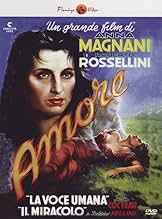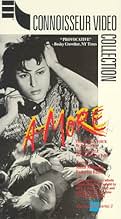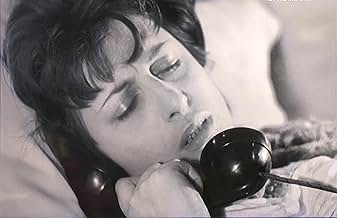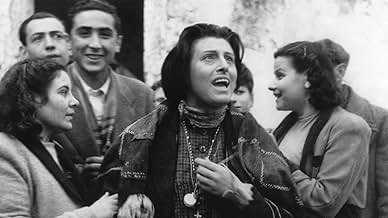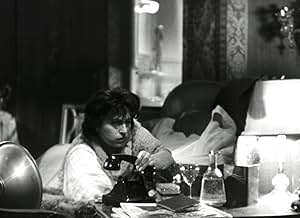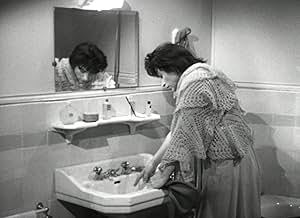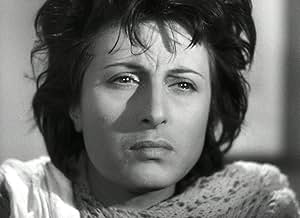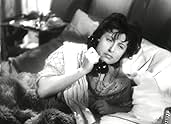AVALIAÇÃO DA IMDb
6,9/10
2,1 mil
SUA AVALIAÇÃO
Adicionar um enredo no seu idiomaIn part one, a heartbroken woman talks to her ex-lover on the phone. In part two, a pregnant woman believes she is carrying the child of Saint Joseph.In part one, a heartbroken woman talks to her ex-lover on the phone. In part two, a pregnant woman believes she is carrying the child of Saint Joseph.In part one, a heartbroken woman talks to her ex-lover on the phone. In part two, a pregnant woman believes she is carrying the child of Saint Joseph.
- Direção
- Roteiristas
- Artistas
- Prêmios
- 2 vitórias e 2 indicações no total
Avaliações em destaque
After the opening credits we see a title that says "This film is an homage to the art of Anna Magnani" and that's exactly what this powerful Rossellini film is about. Magnani dominates both sections of "L'Amore" and is quite remarkable. In the first section which is called "Una Voce Umana"(The Human Voice), Magnani plays a woman in her bedroom who makes a desperate telephone call with her former husband. It is mostly comprised of close-ups of Magnani's grieving face, anticipating those of Rossellini's films starring Ingrid Bergman. In the second section, "Il Maracolo"(The Miracle), Magnani is a peasant who meets and is seduced by a vagabond whom she thinks is Saint Joseph. Though the villagers incessantly ridicule her, she thinks is pregnant with a Christ baby, something that angered the censors and religious groups, ultimately dubbing as "blasphemous". "The Miracle" section is by far the most powerful and provocative". It is characterized by overt Christian symbolism and some gorgeous shots of the countryside. Rossellini makes the viewer aware of the overpowering presence of the environment, itself another character. The scenes where Magnani is lying on the ground surrounded by animals are particularly ravishing and beautiful.
Two short stories about love: the first, based on a Jean Cocteau story, is a powerful sola tour-de-force by the great actress Anna Magnani; it's always hard to pull off an one-set, one-person monologue on the screen successfully, but she does it. The second, based on what can only euphemistically be called a "story" (mostly shots of Magnani walking) by Frederico Fellini, is rambling nonsense; unfortunately, it is also longer than the first episode, and also has nothing really to do with the topic of the title - it does not belong here. *** out of 4 for the first episode, * for the second, ** on average.
L'Amore is divided into two parts, the first called "A Human Voice", and the second named "The Miracle". Anna Magnani is wonderful at both. The first episode is about love and sadness. A woman is pursuing for a man who does not love her any longer. The whole episode occurs whitin a bedroom, with Anna and a telephone. The dialogue of Anna with her ex-husband is simply fantastic and very emotive. The second episode, more cryptic and stronger, shows us a medieval Italian town with all its beliefs and supersticions. A woman, Anna Magnani again, makes remember us the mistery of creation, with symbolic references to some christian icons (as virgins, poor people, saints, etc.). In sum, this is a wonderful film.
When it was scheduled to be shown in New York, L' Amore was protested by religious leaders led by Cardinal Francis Spellman. The film board of New York quickly yanked it before even hitting the screen. After viewing this case, the Supreme Court ruled that for the first time that films are "a significant medium for the communication of ideas." It wasn't until this point that the First Amendment covered film as a freedom of speech. This didn't stop censorship, but it did open new doors.
Roberto Rossellini freely admitted that the two films that make up this opus were designed as a showcase for the talents of his then partner and muse Anna Magnani. Neither film could be said to have had an easy ride as 'Il Miracolo' was banned in America thanks to that self-appointed guardian of morality, the crackpot Catholic League of Decency whilst 'Voce Umana' was not widely shown because of copyright issues with Jean Cocteau's original play.
Ingmar Bergman once said that the greatest contribution to the art of film is the well lit, well directed and well acted close-up. This is certainly true of 'Voce Umana' in which a woman alone in her apartment is desperately trying to salvage a doomed relationship over the telephone and whose agony is intensified by the phone constantly cutting off. The almost microscopic close-ups here hold no fears for Signora Magnani who is utterly riveting. Although this is a shortened version of Cocteau's original it is no less effective and her intensely emotional performance is aided by Eraldo da Roma's dynamic editing and the use of light and dark by cinematographer Otello Martelli. None of us likes rejection of course but one does feel at times like shouting out 'pull yourself together woman, he's obviously not worth it'.
Most directors never find a muse whereas Rossellini had the good fortune to have not one but two. 'Voce umana' is even more poignant, in retrospect, as he left Magnani two years later for muse#2 Ingrid Bergman. Ironically Miss Bergman was to give a powerhouse performance in a longer version of this piece on American television in 1966.
'Il Miracolo' is quite frankly not as accomplished a film. As in so many of his neo-realist films Rossellini is again playing puppet master to a supporting cast mainly composed of 'real people', that is to say non-professionals who cannot act and who are obviously 'dubbed'. The jury is still out on Fellini's acting abilities! Its rawness and immediacy still pack a punch thanks to Anna Magnani's stupendous portrayal of simpleton Nannina, the camerawork of Aldo Tonti and to another powerful score from Rossellini's brother Renzo.
The true 'miracle' of this piece is that the eventual lifting of its ban, based upon the principle of free expression, marked the beginning of the end for film censorship.
Regarding the wondrous Magnani let us leave the last word to William Dieterle who directed her in 'Volcano' at the same time as Rossellini was directing Bergman in 'Stromboli'. "She was the last of the great, shameless emotionalists."
Ingmar Bergman once said that the greatest contribution to the art of film is the well lit, well directed and well acted close-up. This is certainly true of 'Voce Umana' in which a woman alone in her apartment is desperately trying to salvage a doomed relationship over the telephone and whose agony is intensified by the phone constantly cutting off. The almost microscopic close-ups here hold no fears for Signora Magnani who is utterly riveting. Although this is a shortened version of Cocteau's original it is no less effective and her intensely emotional performance is aided by Eraldo da Roma's dynamic editing and the use of light and dark by cinematographer Otello Martelli. None of us likes rejection of course but one does feel at times like shouting out 'pull yourself together woman, he's obviously not worth it'.
Most directors never find a muse whereas Rossellini had the good fortune to have not one but two. 'Voce umana' is even more poignant, in retrospect, as he left Magnani two years later for muse#2 Ingrid Bergman. Ironically Miss Bergman was to give a powerhouse performance in a longer version of this piece on American television in 1966.
'Il Miracolo' is quite frankly not as accomplished a film. As in so many of his neo-realist films Rossellini is again playing puppet master to a supporting cast mainly composed of 'real people', that is to say non-professionals who cannot act and who are obviously 'dubbed'. The jury is still out on Fellini's acting abilities! Its rawness and immediacy still pack a punch thanks to Anna Magnani's stupendous portrayal of simpleton Nannina, the camerawork of Aldo Tonti and to another powerful score from Rossellini's brother Renzo.
The true 'miracle' of this piece is that the eventual lifting of its ban, based upon the principle of free expression, marked the beginning of the end for film censorship.
Regarding the wondrous Magnani let us leave the last word to William Dieterle who directed her in 'Volcano' at the same time as Rossellini was directing Bergman in 'Stromboli'. "She was the last of the great, shameless emotionalists."
Você sabia?
- CuriosidadesWhen, in 1952, the "Il Miracolo" segment of the film was released in the United States as "The Miracle", it was the subject of a legal battle in which the Supreme Court ruled for the first time that motion pictures, like books and newspapers, were protected under the First Amendment to the Constitution.
- Citações
La donna al telefono (segment "Una voce umana"): What? My black satin dress. Yes, I'm still wearing it. No, I didn't smoke. Just three cigarettes. I swear
- ConexõesEdited into Histoire(s) du cinéma: Une histoire seule (1989)
Principais escolhas
Faça login para avaliar e ver a lista de recomendações personalizadas
- How long is Love?Fornecido pela Alexa
Detalhes
- Tempo de duração1 hora 9 minutos
- Cor
- Proporção
- 1.37 : 1
Contribua para esta página
Sugerir uma alteração ou adicionar conteúdo ausente


